仁爱版英语七年级下册基础知识点整理
(完整版)仁爱版英语七年级下全部知识点总结.doc

七年级下英语知识点总结Unit 5 Topic1㈠短语总结1.在学校大门口 at the school gate2.来学校come to school3. 去学校go to school4. 上课have class / have classes5. 步行on foot6.骑自行车ride a bike/ ride bikes/ by bike / on a bike7.坐公交by bus / take a bus8.坐地铁by subway / take the subway / on the subway9.坐飞机by plane/ take the plane / on the plane10.坐小汽车by car / in a car/ take a car/ drive a car11. 坐轮船by ship12. 坐小船by boat13. 坐火车by train / on the train14. 在我们组in our group15.一群学生a group of students16.我们中的三个人 three of us17.在平日 on weekdays18.在周末 on the weekends / at weekends19.起床 get up20.睡觉 go to bed21.早起 get up early22.回家 go home23.到家 get home24.去动物园 go to the zoo25.去公园 go to the park26.看电影 see a movie / film27.看电视 watch TV28.在晚上 in the evening / at night29.帮助父母 help parents30.做某人的家庭作业 do one’s ( my/ her/ his/ your/ their)homework31.在学校 at school32.知道 ,了解 know about / learn about33.校园生活 school life34.一个美国学生 an American student35.在美国 in America / in the U.S.A.36.许多学生 many students/ a lot of students/ lots of students37.很少 very few38.吃午饭 have lunch39.出去吃饭 eat out40.在校期 on school days41.休息一会 have a short rest/ break42.午后 after lunch43.在某人的余 in one’s ( my/ his/ her/ their⋯)free/ spare time44.打球 play basketball45.踢足球 play soccer / football46.琴 play the piano47.吉他 play the guitar48.拉二胡 play erhu49.去游泳 go swimming / go for a swim50.去划船 go boating51.球 a ball game / ball games52.一年四次 four times a year53.听音 listen to music54.read books55.看 read newspapers56.看医生 see a doctor57.去 go to the library58.一周两次 twice a week59.朋友 meet friends60.每天 every day61.在七点半 at half past seven62.一小会 for a little while / for a short time63.晚后 after supper64.吃 have dinner65.吃早 have breakfast㈡重要句型1.I usually come to school by subway.同句 : I usually take the subway to school.划部分提 : How do you usually come to school?似的有:go to school by bike=go to schoolon a bike= ride a bike to school=ride to schoolgo home by bus=go home on a bus=take a bus home2.How do you usually/ often⋯?你通常 /常怎⋯?3.It ’stime for class.=It’s time to have class. =It’s time for having class.4.What about you? =How about you?5.How often ⋯? 率,回答可以用率副: always, usually, often,sometimes, seldom, never, every day ,every +其他名或表示率的短回答表示率的短:次数 +位e.g. : once a day / twice a week / three times a month6.The early bird catches the work. ( ) 笨先7.Work / Study must come first. 工作 / 学必放在第一位!8. Classes begin at eight. =Class begins at eight.提问:What time does the class begin? / What time do the classes begin?㈢重要单词的用法1.look (感官动词 ) 看起来,后面加形容词His mother looks very young.They look very cute.Her dress looks very nice.You look very cool in this coat.2. by 介词by 后面直接加表示交通工具的名词,中间不用任何词修饰,如: by bike by +动词 ing 形式,表示通过某种方式People show love to their mothers by giving cards.You can be a good student by working hard.3.over (形容词 ) School/ Class is over.4.begin现在分词 : beginning 过去式 : beganbegin to do sth , begin doing sthHe begins to write a letter. =He begins writing a letter.如果 begin 本身为分词,只能用begin to do sthHe is beginning to run.5.listen to 听(动作), hear 听见 (结果 )6.always 反义词 never7.本话题涉及的时态为一般现在时,句中常有频率副词或表示频率的短语,如果主语为三单,动词一定要用三单!(四)易错题1.You new watch ______ (look) very nice!2.Here ______(be) some news.3.Oh, come on! It’s time_____ going to school.4.They usually go to school on ________(feet).5.In my class, forty of _______(we) go to school by bike.6.The early bird ______ (catch) the worm.7.Kangkang often _____ (ride) a bike to the park.8.What time _____ (be)school over?9.Work must come ______(once).10.It ’stime ____you to get up.11.We often _____ books in the morning.12.Jill ’s friend like ______(study) in our school.13.Mr. Wang teaches ______(we) English. _____ of us like him.14.How about ______(go) out with me?15.Most students go to school _____ the school bus.16._______ do you go shopping with your mother?A. How soonB. How farC. How oftenD. How much17. What time do you usually get up _____ weekdays?18. He ______ busy, so he has no time to play with us.A. is alwaysB. seldom isC. always isD. often is19.The last class______(finish) at twelve o’clock.20.Let’s go______(boat).21.It’stime to have breakfast. 同(义句 )______________________________________________________.22.Michael often rides a bike to school. 同(义句 )______________________________________________________.23.I always go to work on foot. (对划线部分提问 )______________________________________________________.24.My mother goes shopping twice a week. 对(划线部分提问 )______________________________________________________.25.Mary always reads books in the library. 反(义句 )______________________________________________________.26.He usually does his homework at school.否(定句 )______________________________________________________.27.They often go to school by bus in the morning. 对(划线部分提问 ) ______________________________________________________.28.Jane seldom watches TV on weekdays改.(为一般疑问句 )______________________________________________________.29.He usually has lunch at home. 对(划线部分提问 )______________________________________________________.30.Li Ping often goes to work on foot. (同义句 )______________________________________________________.31.几乎没有学生乘地铁去学校。
仁爱版七年级(下册)知识点要点总结

仁爱版七年级(下册)知识点要点总结本学期研究的知识点包括:
语文
- 形音义的关系
- 修辞手法的运用
- 古诗文的鉴赏
- 现代文阅读与写作
数学
- 相反数与绝对值
- 分数加减乘除
- 二次根式与平方根
- 整式的加减乘除
英语
- 现在进行时
- 祈使句
- 简单过去式
- 数词与日期
历史
- 秦汉和尚书制的改革- 西汉时期的政治和军事- 东汉时期的政治和文化- 三国时期的政治和文化
生物
- 细胞的基本结构和功能- 生物多样性的认识
- 植物的结构和生长
- 动物的体内环境和调节
地理
- 中国的地理位置和自然地理条件
- 中国的人口与经济
- 中国的交通和旅游
- 国际热点问题的认知
政治
- 报告的主要内容
- 中国特色社会主义的本质特征
- 社会主义核心价值观的内涵与精神实质
- 当前的国际形势和中国与世界的关系
以上是本学期主要的知识点汇总。
在学习各科知识的同时,要
注意拓展视野、强化思维训练,努力提高语言表达能力、计算能力、探究能力和综合应用能力。
(完整版)仁爱版七年级英语下册知识点总结
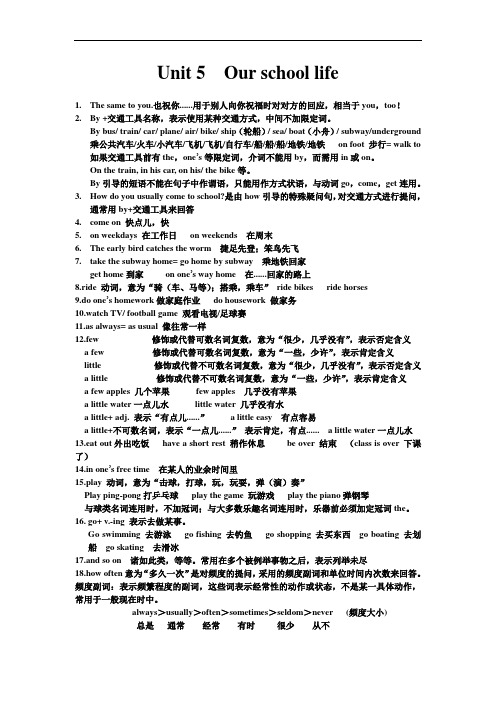
Unit 5 Our school life1.The same to you.也祝你......用于别人向你祝福时对对方的回应,相当于you,too!2.By +交通工具名称,表示使用某种交通方式,中间不加限定词。
By bus/ train/ car/ plane/ air/ bike/ ship(轮船)/ sea/ boat(小舟)/ subway/underground 乘公共汽车/火车/小汽车/飞机/飞机/自行车/船/船/船/地铁/地铁on foot 步行= walk to 如果交通工具前有the,one’s等限定词,介词不能用by,而需用in或on。
On the train, in his car, on his/ the bike等。
By引导的短语不能在句子中作谓语,只能用作方式状语,与动词go,come,get连用。
3.How do you usually come to school?是由how引导的特殊疑问句,对交通方式进行提问,通常用by+交通工具来回答e on 快点儿,快5.on weekdays 在工作日on weekends 在周末6.The early bird catches the worm 捷足先登;笨鸟先飞7.take the subway home= go home by subway 乘地铁回家get home到家on one’s way home 在......回家的路上8.ride 动词,意为“骑(车、马等);搭乘,乘车”ride bikes ride horses9.do one’s homework做家庭作业do housework 做家务10.watch TV/ football game 观看电视/足球赛11.as always= as usual 像往常一样12.few 修饰或代替可数名词复数,意为“很少,几乎没有”,表示否定含义a few 修饰或代替可数名词复数,意为“一些,少许”,表示肯定含义little 修饰或代替不可数名词复数,意为“很少,几乎没有”,表示否定含义a little 修饰或代替不可数名词复数,意为“一些,少许”,表示肯定含义a few apples 几个苹果few apples 几乎没有苹果a little water一点儿水little water 几乎没有水a little+ adj. 表示“有点儿......” a little easy 有点容易a little+不可数名词,表示“一点儿......”表示肯定,有点...... a little water一点儿水13.eat out外出吃饭have a short rest 稍作休息be over 结束(class is over 下课了)14.in one’s free time 在某人的业余时间里15.play 动词,意为“击球,打球,玩,玩耍,弹(演)奏”Play ping-pong打乒乓球play the game 玩游戏play the piano弹钢琴与球类名词连用时,不加冠词;与大多数乐趣名词连用时,乐器前必须加定冠词the。
七年级下册英语仁爱版知识点总结
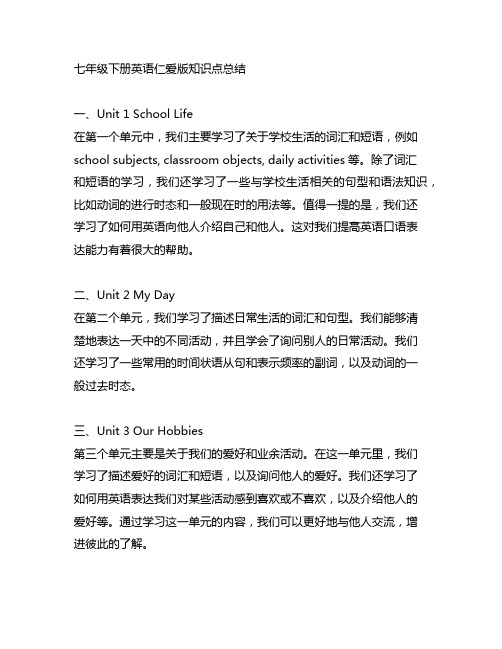
七年级下册英语仁爱版知识点总结一、Unit 1 School Life在第一个单元中,我们主要学习了关于学校生活的词汇和短语,例如school subjects, classroom objects, daily activities等。
除了词汇和短语的学习,我们还学习了一些与学校生活相关的句型和语法知识,比如动词的进行时态和一般现在时的用法等。
值得一提的是,我们还学习了如何用英语向他人介绍自己和他人。
这对我们提高英语口语表达能力有着很大的帮助。
二、Unit 2 My Day在第二个单元,我们学习了描述日常生活的词汇和句型。
我们能够清楚地表达一天中的不同活动,并且学会了询问别人的日常活动。
我们还学习了一些常用的时间状语从句和表示频率的副词,以及动词的一般过去时态。
三、Unit 3 Our Hobbies第三个单元主要是关于我们的爱好和业余活动。
在这一单元里,我们学习了描述爱好的词汇和短语,以及询问他人的爱好。
我们还学习了如何用英语表达我们对某些活动感到喜欢或不喜欢,以及介绍他人的爱好等。
通过学习这一单元的内容,我们可以更好地与他人交流,增进彼此的了解。
四、Unit 4 Celebrations第四个单元主要是关于庆祝活动。
我们学习了描述不同庆祝活动的词汇和短语,以及询问别人关于庆祝活动的相关问题。
我们还学习了一些关于时间的表达方式,比如日期、星期、月份等。
我们还学习了一些关于情感的形容词,以及表示祝福的句型和短语。
五、Unit 5 The World Around Us在第五个单元中,我们学习了描述环境和自然现象的词汇和短语,以及相关的句型和语法知识。
我们可以用英语描述不同的自然现象,比如天气、季节等,也能够表达对自然环境的关心和热爱。
除了这些,我们还学习了一些关于地点和方位的词汇,以及表示允许和禁止的句型和短语。
六、Unit 6 Amazing Stories在第六个单元中,我们学习了一些关于神话故事和传奇人物的词汇和短语。
(仁爱版)英语七年级下册知识点归纳与总结
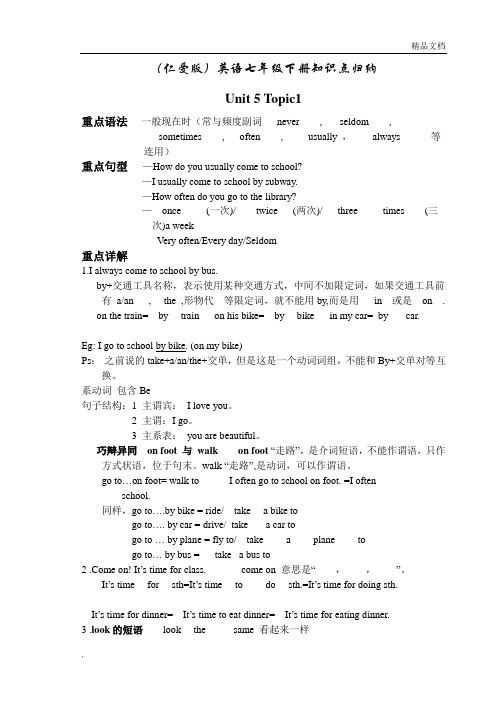
(仁爱版)英语七年级下册知识点归纳Unit 5 Topic1重点语法一般现在时(常与频度副词___never____, ___seldom____,___sometimes____,___often____, ___usually_,____always______等连用)重点句型—How do you usually come to school?—I usually come to school by subway.—How often do you go to the library?—__once_____(一次)/____twice___(两次)/___three ___times____(三次)a weekVery often/Every day/Seldom重点详解1.I always come to school by bus.by+交通工具名称,表示使用某种交通方式,中间不加限定词,如果交通工具前有_a/an___, __the_,形物代_ 等限定词,就不能用by,而是用___in__或是__on__.on the train=__by__ train on his bike=__by__ bike in my car=_by___ car.Eg: I go to school by bike. (on my bike)Ps:之前说的take+a/an/the+交单,但是这是一个动词词组,不能和By+交单对等互换。
系动词包含Be句子结构:1 主谓宾:I love you。
2 主谓:I go。
3 主系表:you are beautiful。
巧辩异同on foot 与walk on foot “走路”,是介词短语,不能作谓语,只作方式状语,位于句末。
walk “走路”,是动词,可以作谓语。
go to…on foot= walk to I often go to school on foot. =I often ________school.同样,go to….by bike = ride/__take__ a bike togo to…. by car = drive/_take___ a car togo to … by plane = fly to/__take__ __a__ __plane__ __to__go to… by bus =___take_ a bus to2 .Come on! It’s time for class. come on 意思是“____,____,____”。
仁爱七年级下册英语知识点
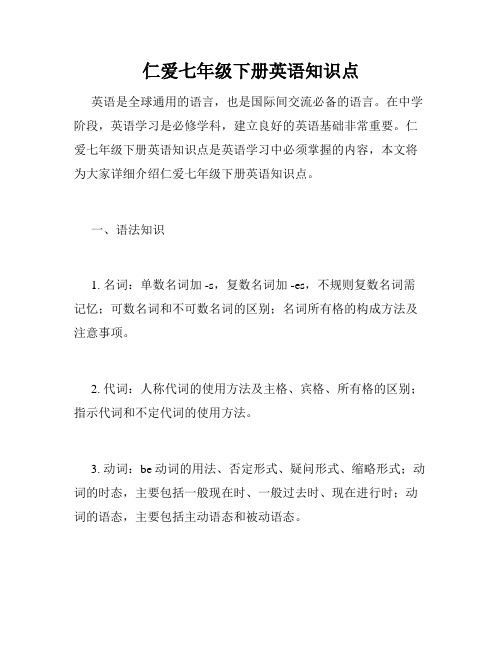
仁爱七年级下册英语知识点英语是全球通用的语言,也是国际间交流必备的语言。
在中学阶段,英语学习是必修学科,建立良好的英语基础非常重要。
仁爱七年级下册英语知识点是英语学习中必须掌握的内容,本文将为大家详细介绍仁爱七年级下册英语知识点。
一、语法知识1. 名词:单数名词加 -s,复数名词加 -es,不规则复数名词需记忆;可数名词和不可数名词的区别;名词所有格的构成方法及注意事项。
2. 代词:人称代词的使用方法及主格、宾格、所有格的区别;指示代词和不定代词的使用方法。
3. 动词:be 动词的用法、否定形式、疑问形式、缩略形式;动词的时态,主要包括一般现在时、一般过去时、现在进行时;动词的语态,主要包括主动语态和被动语态。
4. 形容词和副词:形容词和副词的用法及比较级、最高级的构成方式;形容词修饰名词的位置和使用方法。
5. 介词:介词在句子中的作用及常用的位置;介词短语的使用方法。
6. 连词:并列连词和从属连词的使用方法及区别。
二、词汇知识1. 常用词汇:掌握常用的单词、短语和句型,如问候语、道歉语、感谢语等。
2. 数字:掌握基础的阿拉伯数字和英文数字的表达方法,以及算术运算符号的英文表达。
3. 时间和日期:掌握时间和日期的表达方法,包括小时、分钟、星期、月份等。
4. 季节和天气:掌握四季和天气的表达方法,包括天气状况、气温等。
5. 颜色和形状:掌握常见的颜色和形状,如红、蓝、圆形、长方形等。
三、阅读理解仁爱七年级下册英语教材中有很多有趣的阅读材料,通过阅读这些材料,可以提高阅读理解能力,同时也可以丰富自己的知识。
1. 短篇故事:通过短篇故事来锻炼学生的阅读能力,故事中包含生动的情节和对话,能够增加学生对英语语言的兴趣。
2. 文化阅读:介绍英语国家的文化、风俗等,通过这些内容可以了解到其他国家的文化和差异。
3. 新闻报道:英语新闻报道中的主题、内容、语言和结构都是很好的英语语言学习资料,能够提高学生的英语阅读和理解能力。
仁爱英语七年级下册知识点归纳
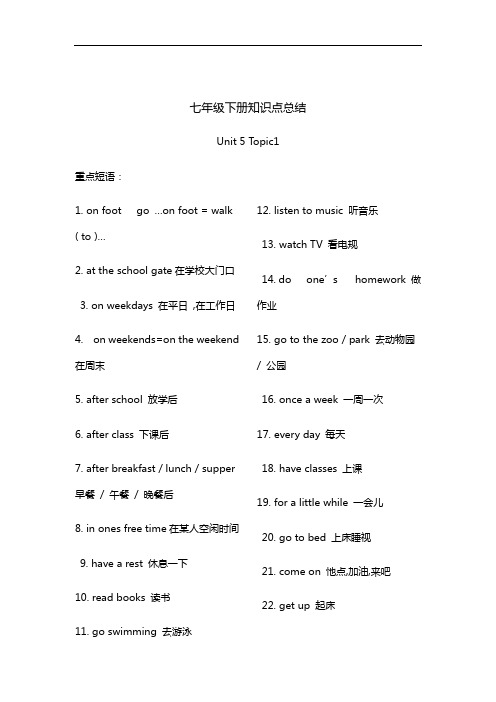
七年级下册知识点总结Unit 5 Topic1重点短语:1. on foot go …on foot = walk ( to )…2. at the school gate在学校大门口3. on weekdays 在平日,在工作日4. on weekends=on the weekend 在周末5. after school 放学后6. after class 下课后7. after breakfast / lunch / supper 早餐/ 午餐/ 晚餐后8. in ones free time在某人空闲时间9. have a rest 休息一下10. read books 读书11. go swimming 去游泳12. listen to music 听音乐13. watch TV 看电规14. do one’s homework 做作业15. go to the zoo / park 去动物园/ 公园16. once a week 一周一次17. every day 每天18. have classes 上课19. for a little while 一会儿20. go to bed 上床睡视21. come on 忚点,加油,来吧22. get up 起床23. talk with / to sb.不某人谈话26. and so on ……等等24. at school 在学校、在上课25. go to school 去上学重点句型 1. Happy New Year! The same to you.2. Your new bike looks very nice. Thank you.3. How do you usually come to school? —I usually come to school by subway.4. How often do you go to the library?5. —Once/Twice/Three times a week/Very often/Every day/Sedom6. The early bird catches the work. (谚语) 笨鸟先飞7. Work / Study must come first. 工作/ 学习必须放在第一位8. Classes begin at eight. =Class begins at eight.9. What time does the class begin? / What time do the classes begin?10. We have no more time. 我们没有更多的时间了。
仁爱版七年级下册英语复习知识点
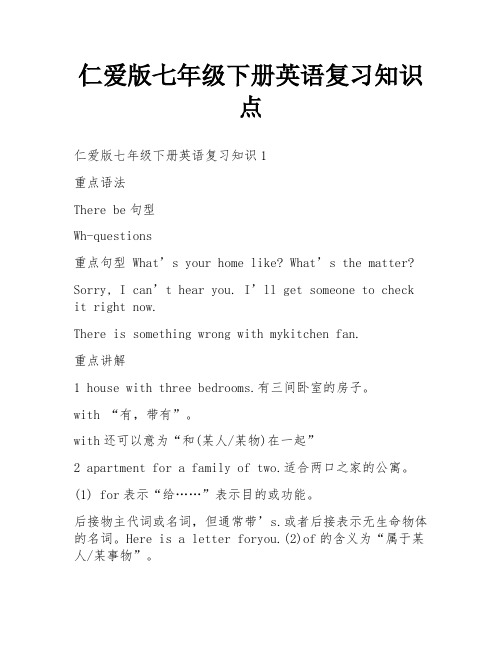
仁爱版七年级下册英语复习知识点仁爱版七年级下册英语复习知识1重点语法There be句型Wh-questions重点句型What’s your home like? What’s the matter?Sorry, I can’t hear you. I’ll get someone to check it right now.There is something wrong with mykitchen fan.重点讲解1 house with three bedrooms.有三间卧室的房子。
with “有,带有”。
with还可以意为“和(某人/某物)在一起”2 apartment for a family of two.适合两口之家的公寓。
(1) for表示“给……”表示目的或功能。
后接物主代词或名词,但通常带’s.或者后接表示无生命物体的名词。
Here is a letter foryou.(2)of的含义为“属于某人/某事物”。
She is a friend of Lily’s. = She is Lily’s friend.3 What’s the matter?怎么了?该句常用来询问某或某物出了什么什么问题或毛病;询问具体某人或某物出了什么问题时,还可以表达为:What’s the matter with sb./sth.某人或某物出了什么毛病。
What’s the matter? = What’swrong?4 Ihear you playing the piano.我听见你在弹钢琴。
hear…doing sth.“听见……在做某事”,强调正在进行的动作。
hear…dosth.“听见……做了某事”,强调全过程。
hearabout sth.听到关于某事物的消息 hear from sb.接到某人的来信、电话等hear of sb./sth.听到或知道某人或某事物的情况5 a lot of = lots of许多后接可数名词,相当于many;后接不可数名词,相当于much,用于肯定句中;但是注意:如果是否定句,则常用many或much.6 be far from… 离……远(抽象距离)be…away from…离……远(具体距离)My school is not far from thebookstore. The sea is 2 miles away fromthe hotel.7 There is something wrong with sb./sth.某人或某物出问题/有毛病了。
- 1、下载文档前请自行甄别文档内容的完整性,平台不提供额外的编辑、内容补充、找答案等附加服务。
- 2、"仅部分预览"的文档,不可在线预览部分如存在完整性等问题,可反馈申请退款(可完整预览的文档不适用该条件!)。
- 3、如文档侵犯您的权益,请联系客服反馈,我们会尽快为您处理(人工客服工作时间:9:00-18:30)。
Unit 5 Our School Life Topic 1 I usually come to school by subway.一.重要词组at the school gate 在校门口by bike/car/bus/subway(underground)/train/plane/ship/boat/on foot 骑自行车,坐小汽车,坐公交车,坐地铁,坐火车,坐飞机,坐轮船,坐小船,步行(介词词组)take the subway home=go home by subway (动词词组)坐地铁回家walk to the park=go to the park on foot (动词词组)步行去公园ride a bike to school=go to school by bike (动词词组)骑自行车去上学take a bus to the zoo=go to the zoo by bus (动词词组)坐公交车去动物园come on 快点,加油on weekdays 在工作日,在平时know about 了解the school life of American students 美国学生们的校园生活in one’s free time (one’s=my/your/his/her/our/their)在某人的业余,空闲时间play basketball/soccer=football 打篮球/踢足球do one’s homework (不可数)(does 单三形式) 做某人的作业see a movie=film 看电影read books 看书listen to music (不可数)听音乐watch TV (watches 单三形式) 看电视for a short time 一会儿after school 放学后be over 结束have no more time 没有更多的时间talk to sb. 和某人谈话come to the library 来图书馆have four classes 上四节课get home 到家go to bed (goes 单三形式) 去睡觉go swimming 去游泳how often 多久一次once a week 一周一次twice a week 一周两次three times a week 一周三次every day 每天at about five o’clock在大约五点钟a quarter past five= five fifteen 五点十五分twenty past five =five twenty 五点二十分half past five=five thirty 五点三十分a quarter to six =five forty-five 五点四十五分be different from 与...不同二.重要句型1. Happy New Year!The same to you! 新年快乐!你也一样2. How do you usually come to school ? 你通常如何来上学?I usually come to school by subway . 我通常坐地铁来上学3 What does he usually do after school? 放学后他通常做什么?He usually plays soccer, but he doesn’t play basketball. 他通常踢足球,但是他不打篮球。
4. The early bird catches the worm. 早起的鸟儿有虫吃。
(笨鸟先飞,捷足先登)5. Classes begin at eight. 八点钟开始上课6. After dinner,she often does her homework,and then watches TV for a short time.晚饭后,她经常做作业,然后看电视一会儿。
.7. H e goes to bed at a quarter to ten 他在九点四十五分睡觉8 What time is school over? 几点钟放学?9.What do they do in their free time? 在他们业余时间他们做什么?10.What time do you usually get up on weekdays? 平时你通常几点起床?11 How often do you come to the library? 你多久来一次图书馆?Very often/Never/Seldom/ Every day/Once a week/Twice a week./Three times a week.非常经常/从未/很少/ 每天/ 一周一次/一周两次/ 一周三次12.It’s time for class/to have classes到了上课的时候了13 Nice talking to you很高兴与你谈话(对话结束时)14.She has four classes in the morning.她早上上四节课。
三.重要语法:频度副词频度副词用来表示动作发生的频率。
它们在程度上有区别,一般可按频率从高到低排列:always>usually>often>sometimes>seldom>never(1)频度副词通常放在be 动词助动词和情态动词之后或实义动词之前;表示确切频度的副词如once a week,every day 等通常置于句末,但sometimes 可放在句首如:She is sometimes very busy.=Sometimes she is very busy. 她有时很忙He is never late for school. 他从不上学迟到You don’t always like playing. 你不总是爱玩I seldom go to school by car. 我很少坐小汽车上学They walk to school every day. 他们每天走路上学(2)o ften ,always ,usually 等频度副词通常和一般现在时连用,表示经常或反复发生的动作。
Li Ming usually goes to the park with her friends on Sunday.(3) 对这些频度副词提问时,都用how often.,sometimes,seldom,never 填空,每词限用一次She can’t ride a bike well.So she goes to school by bike.They go to school by bus,but they ride a bike.What do you usually do after school?I go fishing.My mother get up at six,seven days a week.I get up early in the morning.So I get to school late.What do your parents do in the evening?They watch TV.二.用所给动词的适当形式填空:1. Mary usually (have) lunch at school.2.They often (fly) kites after school.3.---How he (go) to work?---He always (go) to work by car.4.---Does Jim sometimes (take ) the subway to school?----No,he seldom (take )the subway to school.5.She never (get ) up late in the morning.6. The early bird (catch)the worm.7. Maria (watch)TV for a short time and then (do)her homeworkevery day.8. Tom (study ) hard every dayUnit 5 Topic 2 A few students are running around the playground一、重点词组1. on the playground 在操场2. in the swimming pool 在游泳池里3. on the shelf/ shelves(复数) 在书架上4. like…best;favorite 最喜欢5. on time 准时6. at school / home / table 在学校;家里;桌旁7. o ver there 在那边8. do one’s homework 做家庭作业9. on the Great Wall 在长城上10. of course=sure 当然可以11. have an English class /lesson 上英语课12. one day 有一天13. Thank you anyway. / Thank you all the same 仍然感谢你.14.at the Lost and Found 在失物招领处15. on the telephone 通过电话16. play cards 打牌17. do some cleaning 打扫18. ID card 身份证19. watch TV 看电视watch movies 看电影watch games 看比赛watch the animals 看动物20. show sb. around 带某人参观21. have a soccer game 进行足球比赛22. write a letter 写信23. clean the blackboard 擦黑板24. at the back of 在……后面(内部)25. draw pictures 画画26. play on the computer 玩电脑27. in a c omputer room / teachers’ office / classroom building / gym / library / lab / dining hall在电脑室;教师办公室;教学楼;健身房;图书馆;实验室;食堂28. make cards 制作卡片29. look for 寻找30. run around the playground 绕着操场跑31. a few students=some students 一些学生32. play ping-pong 打乒乓球33. read English newspapers 看英语报34. clean the blackboard 擦黑板35. some photo of his 一些他的照片36. love swimming 喜欢游泳二、重点句型1. What are you doing now? 你现在正在做什么?2. Are you doing your homework? 你正在做家庭作业吗?Yes , I am . / No, I’m not. 是的,我是。
